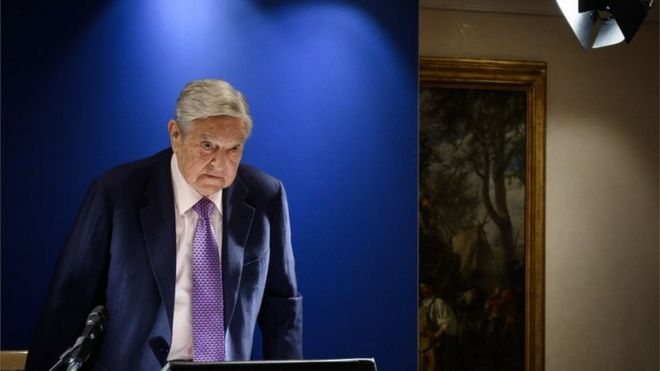China’s Xi Jinping 'most dangerous' to free societies, says George Soros

The billionaire philanthropist George Soros has used his annual speech at the World Economic Forum, in Davos, to launch a scathing attack on China and its president Xi Jinping.
Mr Soros warned that artificial intelligence and machine learning could be used to entrench totalitarian control in the country.
He said this scenario presented an "unprecedented danger".
But he said the Chinese people were his "main source of hope".
"China is not the only authoritarian regime in the world but it is the wealthiest, strongest and technologically most advanced," he said, noting concerns too about Vladimir Putin's Russia.
'Security risk'
"This makes Xi Jinping the most dangerous opponent of open societies," he said.
Mr Soros, a prominent donor to the Democratic Party in the US, also criticised the Trump administration's stance towards China.
"Instead of waging a trade war with practically the whole world, the US should focus on China," he said.
He urged Washington to crack down on Chinese technology companies such as Huawei and ZTE, which he said present an "unacceptable security risk for the rest of the world".
More broadly, Mr Soros cautioned that repressive regimes could utilise technology to control their citizens, in what he called "a mortal threat to open societies"
The 88-year-old Hungarian-born Jewish businessman, who survived Nazi occupation by forging identity documents, became infamous for his involvement in the devaluation of the British pound, known as Black Wednesday.
But it is his philanthropic and political activities that have made him a divisive figure in the US, Europe and beyond.
Bribes
He has spent billions of his own money funding human rights projects and liberal democratic ventures around the world, and has become a frequent target for criticism by right-wing groups due to his support for liberal causes.
Much of the criticism aimed at him has been criticised as having anti-Semitic undertones.
Last year, a suspect package was found in a post box at his home in New York.
Mr Soros used his Davos speech last year to lambast tech giants such as Facebook, and what he considered to be their corrosive effect on democratic systems.
But this year, he directed his wrath towards Beijing, and particularly its controversial "Belt and Road" investment plan, which pays for road, rail and sea links to boost trade with countries around the world.
"It was designed to promote the interests of China, not the interests of the recipient countries," he said.
"Its ambitious infrastructure projects were mainly financed by loans, not by grants, and foreign officials were often bribed to accept them."





Post a Comment